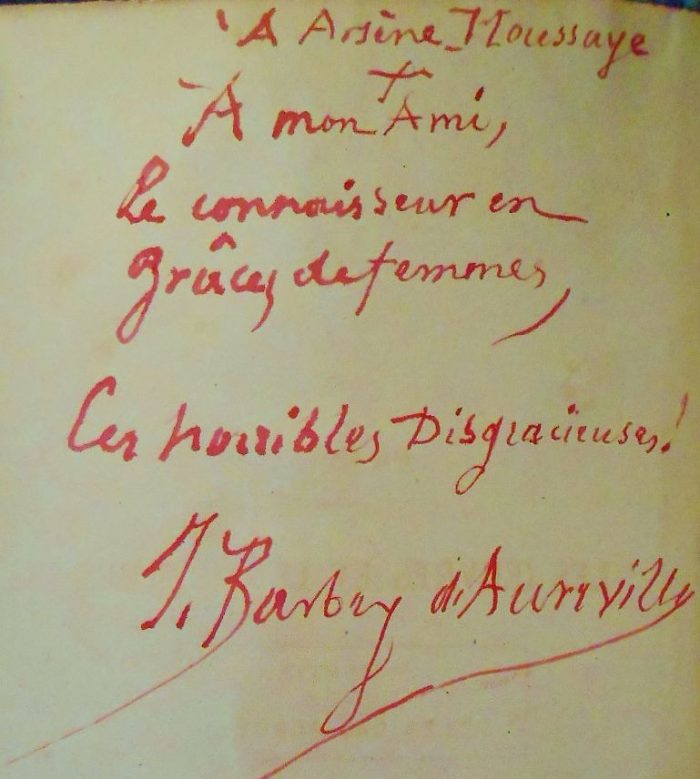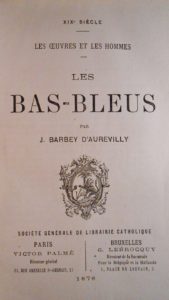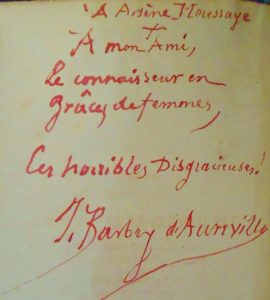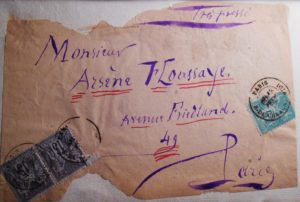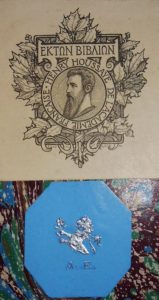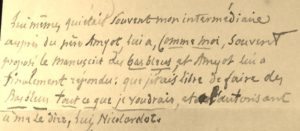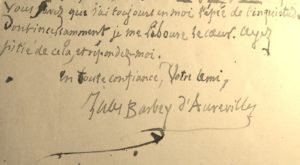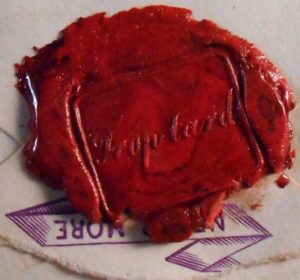Jules Barbey d’Aurevilly. Les Bas-bleus. Paris, Victor Palmé et Bruxelles, G. Lebrocquy, 1878. In-12. XXIII introductory pages, 1 blank page, and 346 pages. Blue velvet Bradel binding, havana sheepskin morocconed label , blue and red cover preserved.
Original edition forming the fifth part of Les Œuvres et les Hommes.
Barbey d’Aurevilly traces acid portraits of women of letters : “Women who write, he says, are no longer women. They’re men., — at least pretentiously, — and missed ! They’re Bas-Bleus. “. When he was told that he gave himself many enemies, he answered: “When there are a thousand of them, I’ll put myself at the head of the regiment, will lead them to death, and , as they will be behind me, I will have the joy of not seeing them”. Some chapters are devoted, among others,, to George Sand “pedantic sassing and doctrinaire and placid”, to Louise Colet”s union, claudicant pittoresquement, of a Gorgon and Madame Trissotin”, and to Mrs. de Stael “who kept all the undulating defects, inconsequential, charming and bewitching woman”.
With, red ink, a beautiful unpublished dedication by the author “improvising Arsène Houssaye / + / improvising My friend, / The connoisseur in / women’s graces, / These horrible unsightly! / J. Barbey d’Aurevilly “. Jean de Bonnefon describes how the author wrote his “dazzling or benevolent dedications […]. It was the simplest in the world. M. Barbey d’Aurevilly was taking a book, opened it to the cover page, and his mighty hand crushed a line, two lines, that always contained an idea “.
Copy with an autographed envelope of Barbey d’Aurevilly, in blue ink underlined in red, to “Monsieur / Arsène Houssaye / avenue Friedland / 49 / Paris “with the words “Très pressé ” in the upper right corner; The stamped envelope is glued to a cover page. Arsène Houssaye, “one of the last great oaks of the romantic forest”, as Zola called him, had intervened in 1874 to avoid Barbey a trial about the Diaboliques.
From Henry Houssaye’s library, historian and art critic, Academician, Arsène Houssaye’s son, with his ex-libris engraved ; followed by another embossed ex-libris featuring a silver lion holding a rose and the initials A.E., all on blue background.
Vicaire, Manuel de Livres du XIXth century, t. I, col. 300. The dedication is not in J. de Bonnefon, Les Dédicaces à la main de M. J. Barbey d’Aurevilly, Paris, Blaizot, 1908.
Worn back. Very nice copy however, with a remarkable dedication and a prestigious provenance.
[Enclosed:]
Author’s signed autograph letter, Jules Barbey d’Aurevilly, Hôtel Granval, Dimanche 23 [December 1877], to Victor Lalotte. 3 pages and 1 line in-8°, autograph envelope addressed to “Monsieur / Victor Lalotte, / 57 boulevard Montparnasse /57 // Paris. ” (stamp cut out, red owner’s stamp with his motto “Too Late” affixed to his other printed motto “Never more”).
Very interesting letter on the rights of his Bas-bleus.
“My dear Mr. Lalotte,
I was asleep on your good letter, when a letter from Nicolardot came very unpleasantly wake me up.
He sends to me that Amyot went to Palmé’s & that he said : that he was going to sue me correctional police for stellionnat.
It’s odious and deeply stupid. But we have to believe in human stupidity, because that’s the most common thing in the world.
Just, I would like to know if the comment was made. So give me the pleasure of going to Palmé’s and ask him.
In any case, we’re safe, I think so, of this vile accusation. I was in the utmost good faith, selling to Palmé, after the refusals Father Amyot to take my bas-bleus, – repeated refusals before his bankruptcy. M. Nicolardot, himself, who was often my intermediary with Father Amyot, to him, like me, often proposed the manuscript of the bas bleus, and Amyot finally answered : that I was free to do everything I want about Bas bleus, and allowing him to tell me, him, Nicolardot.
What in court, Nicolardot, he told me – he would say.
However, and some weapons we had, this idea of stellionate trial is a concern for me. – Reassure me. If we had done real offers, the trial, if it’s going to come, would only come to civil. But isn’t that real offers & better than real offers the formal notice we made to M. Amyot to make his claims ?.. I think and don’t you think he should be reviewed and urged to say what he wants, – Because I want to end it of this unpleasant affair, which is not worth the torment it gives me & whose concern prevents me from working well.
If you love me, my dear Negotiator – and I have no doubt, – answer me post to post. You know that I always have in me the sword of worry which I constantly plow my heart. Have mercy on that, and answer me.
Confidently, your friend
Jules Barbey d’Aurevilly
Written in my hand & in a hurry.
answer. “
[With on the back:]
“To the 31 Xber ! “
On stellionat is the name given to a fraud characterized by the fact that a person has sold, or that she mortgaged a property that she knew did not belong to her. It also designates for the seller, concealing from the purchaser the existence of a mortgage on the property that is the subject of the transfer.
Barbey had dealt with Amyot for the edition of the five volumes, including the last one, Les Bas-Bleus, before he went bankrupt. As soon 1873, however, he had begun negotiations with Palmé, who will eventually publish in 1878 Les Bas-bleus, volume V, in the series Les Œuvres et les Hommes. The author’s fears are therefore well founded, and Amyot’s claims justified.
Correspondance générale, t. VIII, p. 135.
3 500 €
